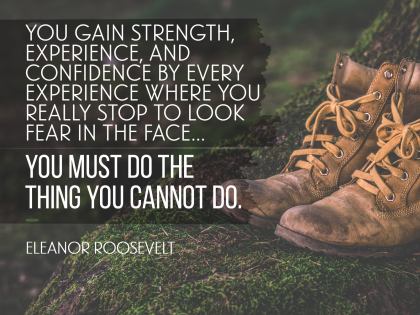Top 10 Ways to be More Assertive in Life
Assertiveness is that fine line between being aggressive and passive. Aggressiveness and passiveness can be advantageous at times, but an attitude of assertiveness is most often the most effective position to take.
When you’re assertive, you’re willing to make your needs known and to take responsibility for your life. There are many advantages to being assertive.

Personal Development Blog Ebooks -OR-
This Ebook: Assertiveness Training 101
Follow these strategies to learn to be more assertive and take control of your life:
1. Understand what assertiveness really means. Some people are reluctant to be assertive because they consider it as similar to being aggressive. One definition of assertiveness is, “The ability to honestly express your opinions, feelings, attitudes, and rights, without undue anxiety, in a way that doesn’t infringe on the rights of others.”
2. Assess yourself. Some people would benefit by being more assertive in every part of their lives. Others are assertive in some areas but lacking in others. In what part of your life are you either too passive or too aggressive?
3. Decide how you can be more assertive in those situations. Suppose you’re not assertive in your romantic relationships. Think of ways you can be more assertive. Have a plan and start working on it.
4. Take responsibility for the challenges in your life. Passive people hope that someone else or fate will solve their challenges. Assertive people take care of their own messes. Passive people blame fate. Aggressive people blame others. Put yourself in the position where you can take credit for your ups and downs.

About the Inspirational Poster by Eleanor Roosevelt
5. Avoid feeling responsibility for the behavior and feelings of others. If you’re constantly submitting to the wishes of others, you feel some responsibility for their feelings. Worry about your own behavior and feelings. Others can do the same.
6. Give your opinion when asked. When someone asks you where you want to go to dinner, or what movie you want to see, give them an answer. You’re not being nice by responding, “I don’t care. Where do you want to eat?” If someone asks your opinion, give it.
7. Start saying “no” more often. The ability to say no is the sign of a healthy relationship. It’s okay to tell people no when saying yes would be too inconvenient for you. You don’t gain anything by making yourself miserable. Be willing to say “no” when necessary.
8. Practice. Some situations are just psychologically easier to manage when you’re learning to be assertive. You might speak up and give your opinion in a meeting or tell your teenager what you expect from them regarding the cleanliness of their room. Choose a few situations in which to practice.

AD by Inspirational Media
9. Pay attention to your body language. Assertiveness isn’t only demonstrated through your words. You broadcast your level of assertiveness with your body language. Work on your posture and eye contact for starters. Practice in front of a mirror and with your friends.
10. Build your social skills. If you’re not comfortable socially, you’re likely to either be passive or aggressive, but not assertive. Social skills can be developed and provide a foundation for assertiveness. Work with a friend that has excellent social skills or get your hands on a few good books on the topic.
Assertiveness has several advantages. Assertive people suffer from less stress and anxiety. Assertiveness also provides a feeling of control over your life.
It’s not easy to move from passivity or aggressiveness to assertiveness, but the advantages are considerable. Be patient with yourself and begin your journey to taking more responsibility for your life, emotions, and challenges.
Featured Personal Development Ebook:
View more gifts at PersonalDevelopment.





